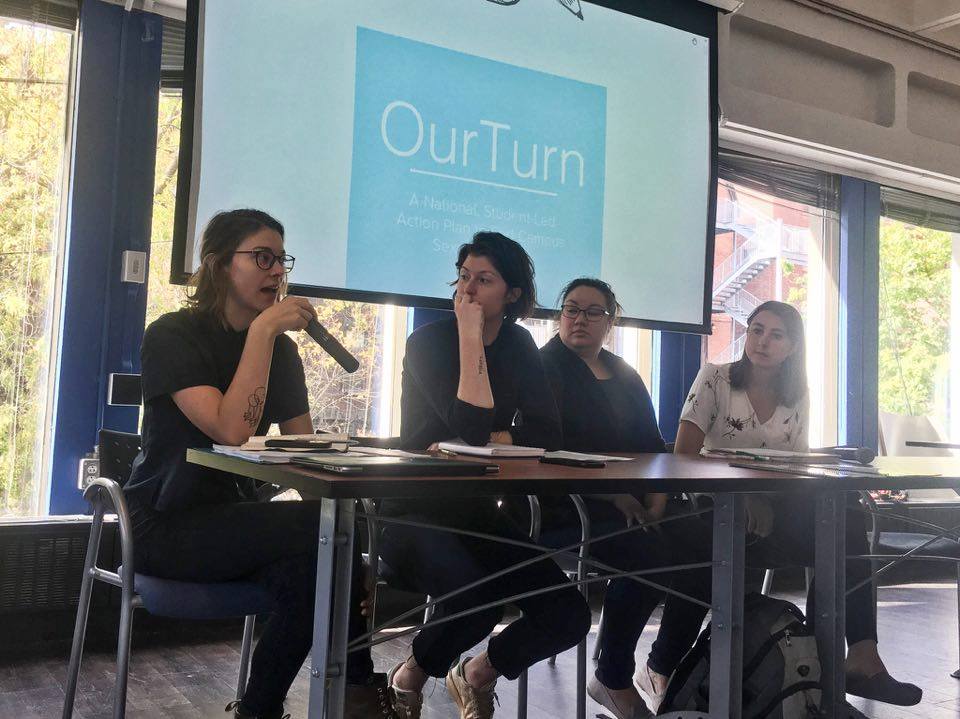Content warning: discussion of sexual violence
On October 11, The Students’ Society of McGill University (SSMU) and the Concordia Student Union (CSU) held a joint press conference to address the prevalence of sexual violence on Canadian campuses. In conjunction with Our Turn, a national, student-led campaign to combat sexual violence on college campuses, SSMU hosted the press conference in order to assert its commitment to confronting all forms of sexualized violence.
We can’t just accept that [sexual violence] will be happening at the university level. We need to take action to protect each other and to protect ourselves.
SSMU VP External Connor Spencer explained that the decision to partner with Our Turn was made partly in response to recent allegations of sexual violence made against former SSMU VP External David Aird. The partnership was also forged as a means of acting on Our Turn’s recent evaluation of sexual violence policies on campuses across Canada; McGill’s policy received a C- grade. “We can’t just accept that [sexual violence] will be happening at the university level. We need to take action to protect each other and to protect ourselves,” Spencer stated.
Spencer iterated her commitment to ensuring that the initiative to address flaws in the current policy will be student-led. “It will be the students that will hold McGill accountable and will push the conversation forward. Just because we have a sexual violence policy […] does not mean we are at the end of this conversation about the sexual violence that happens everyday on this campus,” Spencer said.
Our Turn chair Caitlin Salvino discussed the ways in which Canadian campus sexual violence policies fail to properly address sexual violence and support survivors. Underfunded counseling centres and a lack of prevention training top the list.
Survivors need choices to be able to make decisions based on the specific situation that they are in [so that] they are not forced into a situation they might be uncomfortable with.
“We are creating sexual violence policies that are flawed, and that have loopholes, and that aren’t properly supportive of survivors,” Salvino maintained.
The Dean of Students is currently reviewing the Student Code of Conduct, which Spencer believes is a step in the right direction, as it allows an opportunity to further review how a sexual violence policy could be implemented at the disciplinary level. Additionally, Our Turn’s evaluation indicated that McGill scores well on education, which Spencer highlighted.
So often, the institution has made people feel alone.
But the assembled panel stated that more can be done. Spencer maintained that a “stand-alone” policy must be the foundation of any improvements to the existing policy.
“Survivors need choices to be able to make decisions based on the specific situation that they are in [so that] they are not forced into a situation they might be uncomfortable with,” Spencer said. Spencer ended the event by communicating her desire to work with the McGill administration to craft a sexual violence policy that addresses the specific needs of survivors, and works to implement a comprehensive strategy of prevention. But this effort, she noted, must be mounted by the student body.
“So often, the institution has made people feel alone. So we have had to protect each other, and we will continue to protect each other,” Spencer said. “We will work as much as we can to protect our members, both at the university level and at the grassroots level.”
This article was updated on October 16 to reflect discrepancies regarding the passage of the Sexual Violence Policy and who it covers. A previous version of this article implied that students were uninvolved in the passage of the current Policy, as was iterated at the Press Conference, and that the Policy does not cover McGill faculty and staff. In fact, the Policy covers all members of the university community, including faculty and staff, and students have been highly involved in the process.









1 Comment